Enron & Lehman Scandals: A Business Strategy Audit and Ethical Review
VerifiedAdded on 2023/06/04
|11
|3133
|206
Report
AI Summary
This report provides an analysis of the Enron and Lehman Brothers scandals, focusing on the role of auditors, ethical behavior, and the impact of accounting standards. It highlights the failures in auditing practices that contributed to the collapse of these organizations and discusses the importance of auditor independence and ethical conduct. The report also examines the measures taken to improve the auditing profession, such as the Sarbanes-Oxley Act and the establishment of the Public Company Accounting Oversight Board (PCAOB). Key recommendations are made to prevent future accounting failures, emphasizing the need for stricter regulations, enhanced transparency, and greater accountability in financial reporting.
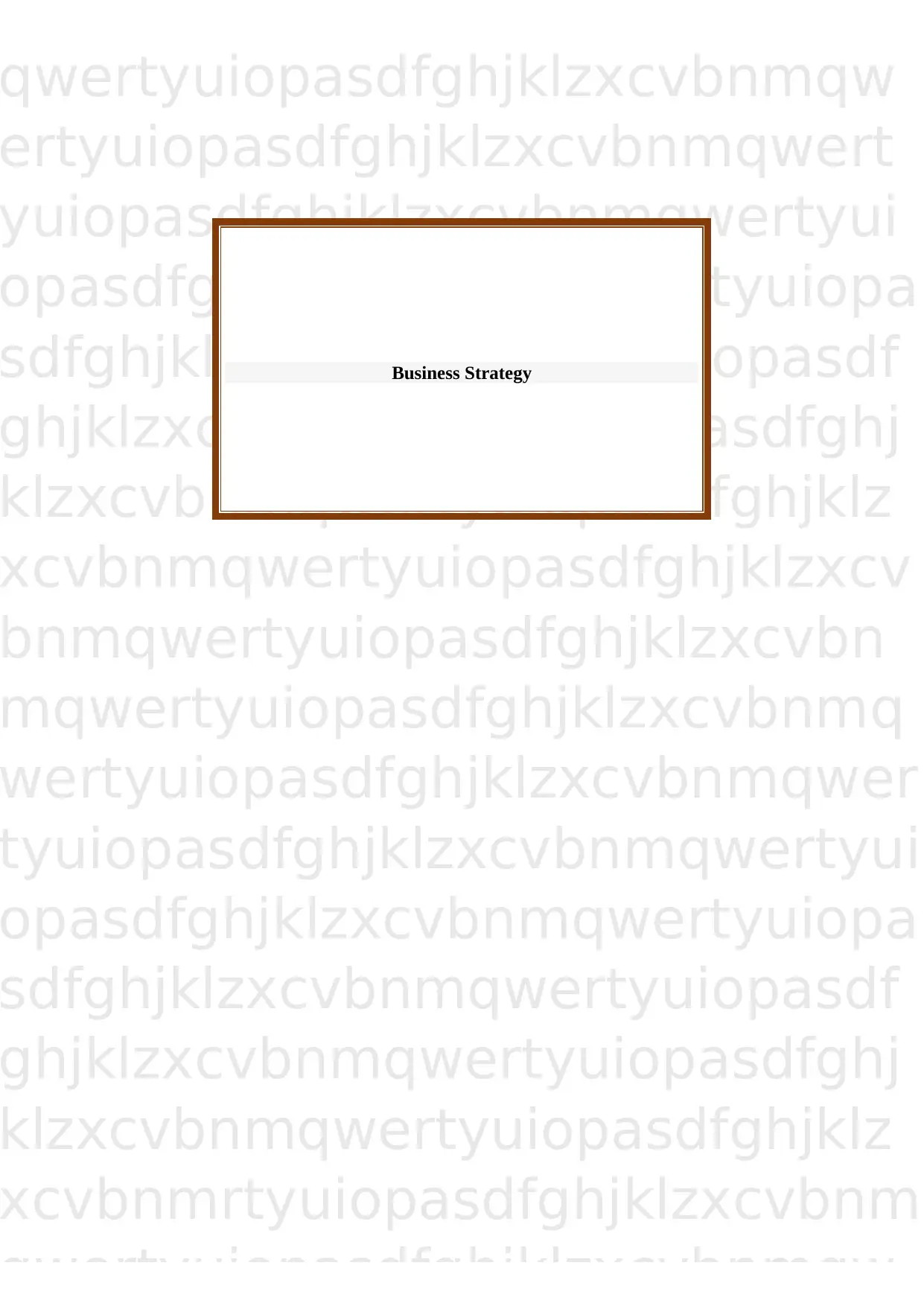
qwertyuiopasdfghjklzxcvbnmqw
ertyuiopasdfghjklzxcvbnmqwert
yuiopasdfghjklzxcvbnmqwertyui
opasdfghjklzxcvbnmqwertyuiopa
sdfghjklzxcvbnmqwertyuiopasdf
ghjklzxcvbnmqwertyuiopasdfghj
klzxcvbnmqwertyuiopasdfghjklz
xcvbnmqwertyuiopasdfghjklzxcv
bnmqwertyuiopasdfghjklzxcvbn
mqwertyuiopasdfghjklzxcvbnmq
wertyuiopasdfghjklzxcvbnmqwer
tyuiopasdfghjklzxcvbnmqwertyui
opasdfghjklzxcvbnmqwertyuiopa
sdfghjklzxcvbnmqwertyuiopasdf
ghjklzxcvbnmqwertyuiopasdfghj
klzxcvbnmqwertyuiopasdfghjklz
xcvbnmrtyuiopasdfghjklzxcvbnm
qwertyuiopasdfghjklzxcvbnmqw
Business Strategy
ertyuiopasdfghjklzxcvbnmqwert
yuiopasdfghjklzxcvbnmqwertyui
opasdfghjklzxcvbnmqwertyuiopa
sdfghjklzxcvbnmqwertyuiopasdf
ghjklzxcvbnmqwertyuiopasdfghj
klzxcvbnmqwertyuiopasdfghjklz
xcvbnmqwertyuiopasdfghjklzxcv
bnmqwertyuiopasdfghjklzxcvbn
mqwertyuiopasdfghjklzxcvbnmq
wertyuiopasdfghjklzxcvbnmqwer
tyuiopasdfghjklzxcvbnmqwertyui
opasdfghjklzxcvbnmqwertyuiopa
sdfghjklzxcvbnmqwertyuiopasdf
ghjklzxcvbnmqwertyuiopasdfghj
klzxcvbnmqwertyuiopasdfghjklz
xcvbnmrtyuiopasdfghjklzxcvbnm
qwertyuiopasdfghjklzxcvbnmqw
Business Strategy
Paraphrase This Document
Need a fresh take? Get an instant paraphrase of this document with our AI Paraphraser
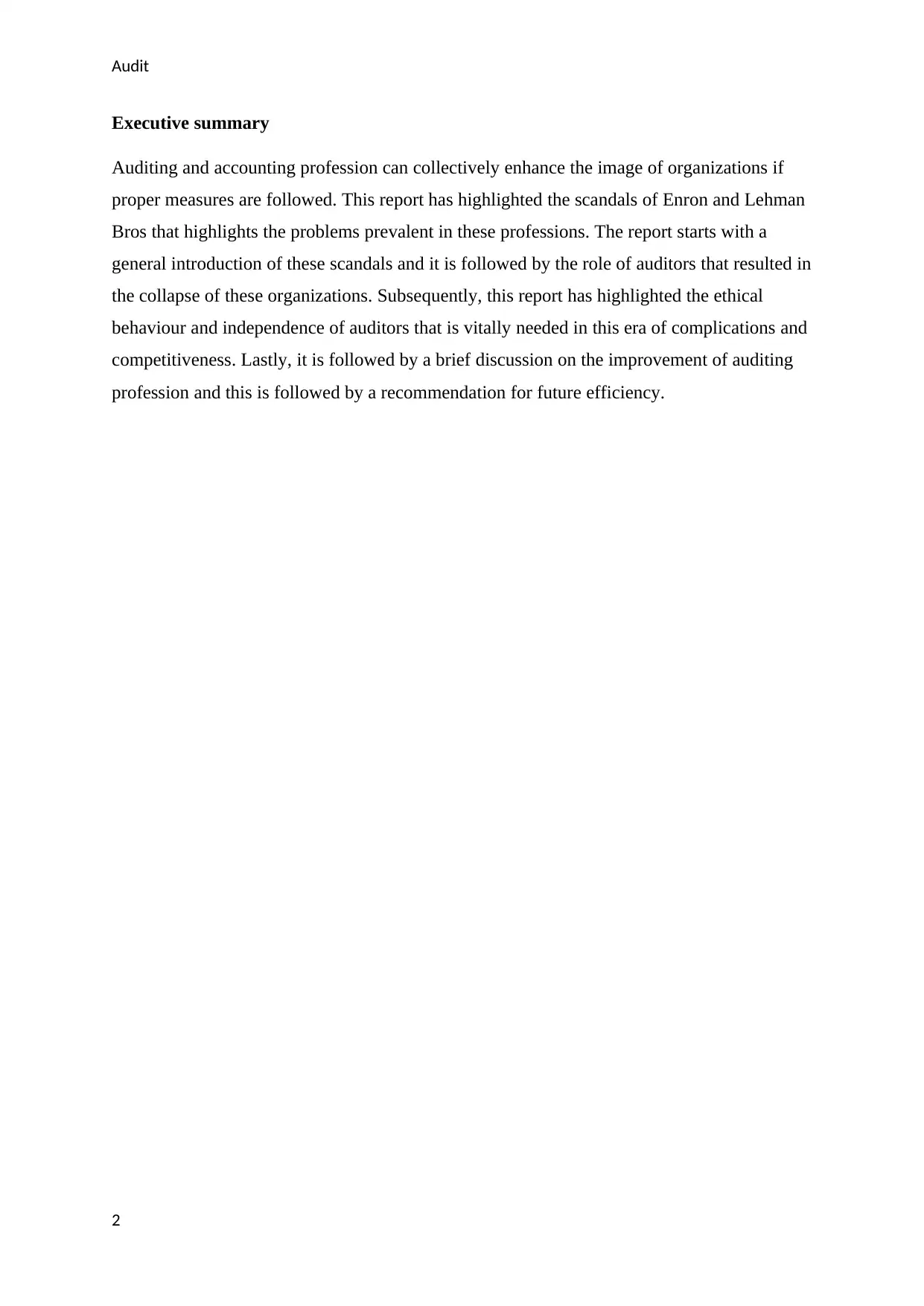
Audit
Executive summary
Auditing and accounting profession can collectively enhance the image of organizations if
proper measures are followed. This report has highlighted the scandals of Enron and Lehman
Bros that highlights the problems prevalent in these professions. The report starts with a
general introduction of these scandals and it is followed by the role of auditors that resulted in
the collapse of these organizations. Subsequently, this report has highlighted the ethical
behaviour and independence of auditors that is vitally needed in this era of complications and
competitiveness. Lastly, it is followed by a brief discussion on the improvement of auditing
profession and this is followed by a recommendation for future efficiency.
2
Executive summary
Auditing and accounting profession can collectively enhance the image of organizations if
proper measures are followed. This report has highlighted the scandals of Enron and Lehman
Bros that highlights the problems prevalent in these professions. The report starts with a
general introduction of these scandals and it is followed by the role of auditors that resulted in
the collapse of these organizations. Subsequently, this report has highlighted the ethical
behaviour and independence of auditors that is vitally needed in this era of complications and
competitiveness. Lastly, it is followed by a brief discussion on the improvement of auditing
profession and this is followed by a recommendation for future efficiency.
2
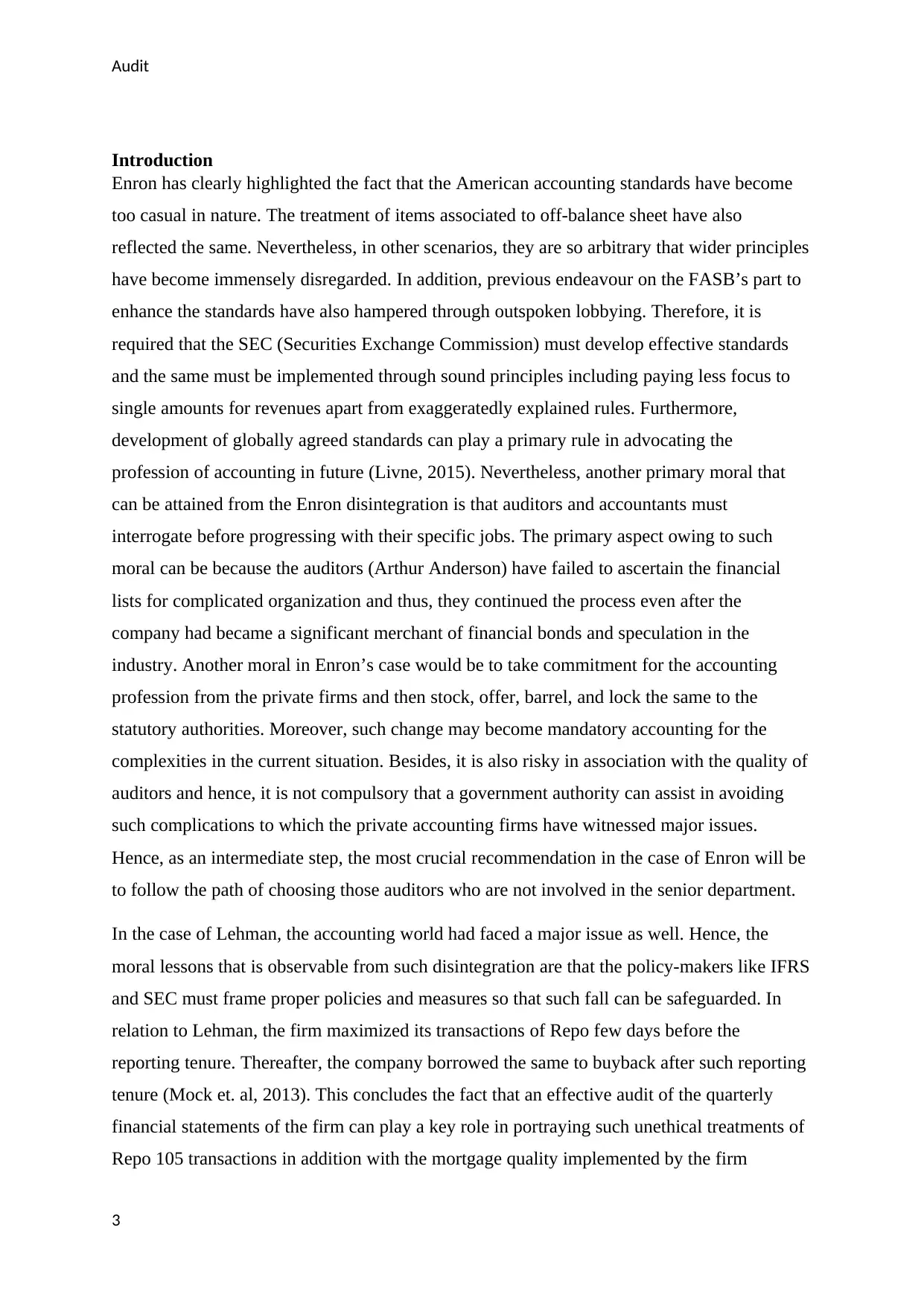
Audit
Introduction
Enron has clearly highlighted the fact that the American accounting standards have become
too casual in nature. The treatment of items associated to off-balance sheet have also
reflected the same. Nevertheless, in other scenarios, they are so arbitrary that wider principles
have become immensely disregarded. In addition, previous endeavour on the FASB’s part to
enhance the standards have also hampered through outspoken lobbying. Therefore, it is
required that the SEC (Securities Exchange Commission) must develop effective standards
and the same must be implemented through sound principles including paying less focus to
single amounts for revenues apart from exaggeratedly explained rules. Furthermore,
development of globally agreed standards can play a primary rule in advocating the
profession of accounting in future (Livne, 2015). Nevertheless, another primary moral that
can be attained from the Enron disintegration is that auditors and accountants must
interrogate before progressing with their specific jobs. The primary aspect owing to such
moral can be because the auditors (Arthur Anderson) have failed to ascertain the financial
lists for complicated organization and thus, they continued the process even after the
company had became a significant merchant of financial bonds and speculation in the
industry. Another moral in Enron’s case would be to take commitment for the accounting
profession from the private firms and then stock, offer, barrel, and lock the same to the
statutory authorities. Moreover, such change may become mandatory accounting for the
complexities in the current situation. Besides, it is also risky in association with the quality of
auditors and hence, it is not compulsory that a government authority can assist in avoiding
such complications to which the private accounting firms have witnessed major issues.
Hence, as an intermediate step, the most crucial recommendation in the case of Enron will be
to follow the path of choosing those auditors who are not involved in the senior department.
In the case of Lehman, the accounting world had faced a major issue as well. Hence, the
moral lessons that is observable from such disintegration are that the policy-makers like IFRS
and SEC must frame proper policies and measures so that such fall can be safeguarded. In
relation to Lehman, the firm maximized its transactions of Repo few days before the
reporting tenure. Thereafter, the company borrowed the same to buyback after such reporting
tenure (Mock et. al, 2013). This concludes the fact that an effective audit of the quarterly
financial statements of the firm can play a key role in portraying such unethical treatments of
Repo 105 transactions in addition with the mortgage quality implemented by the firm
3
Introduction
Enron has clearly highlighted the fact that the American accounting standards have become
too casual in nature. The treatment of items associated to off-balance sheet have also
reflected the same. Nevertheless, in other scenarios, they are so arbitrary that wider principles
have become immensely disregarded. In addition, previous endeavour on the FASB’s part to
enhance the standards have also hampered through outspoken lobbying. Therefore, it is
required that the SEC (Securities Exchange Commission) must develop effective standards
and the same must be implemented through sound principles including paying less focus to
single amounts for revenues apart from exaggeratedly explained rules. Furthermore,
development of globally agreed standards can play a primary rule in advocating the
profession of accounting in future (Livne, 2015). Nevertheless, another primary moral that
can be attained from the Enron disintegration is that auditors and accountants must
interrogate before progressing with their specific jobs. The primary aspect owing to such
moral can be because the auditors (Arthur Anderson) have failed to ascertain the financial
lists for complicated organization and thus, they continued the process even after the
company had became a significant merchant of financial bonds and speculation in the
industry. Another moral in Enron’s case would be to take commitment for the accounting
profession from the private firms and then stock, offer, barrel, and lock the same to the
statutory authorities. Moreover, such change may become mandatory accounting for the
complexities in the current situation. Besides, it is also risky in association with the quality of
auditors and hence, it is not compulsory that a government authority can assist in avoiding
such complications to which the private accounting firms have witnessed major issues.
Hence, as an intermediate step, the most crucial recommendation in the case of Enron will be
to follow the path of choosing those auditors who are not involved in the senior department.
In the case of Lehman, the accounting world had faced a major issue as well. Hence, the
moral lessons that is observable from such disintegration are that the policy-makers like IFRS
and SEC must frame proper policies and measures so that such fall can be safeguarded. In
relation to Lehman, the firm maximized its transactions of Repo few days before the
reporting tenure. Thereafter, the company borrowed the same to buyback after such reporting
tenure (Mock et. al, 2013). This concludes the fact that an effective audit of the quarterly
financial statements of the firm can play a key role in portraying such unethical treatments of
Repo 105 transactions in addition with the mortgage quality implemented by the firm
3
⊘ This is a preview!⊘
Do you want full access?
Subscribe today to unlock all pages.

Trusted by 1+ million students worldwide
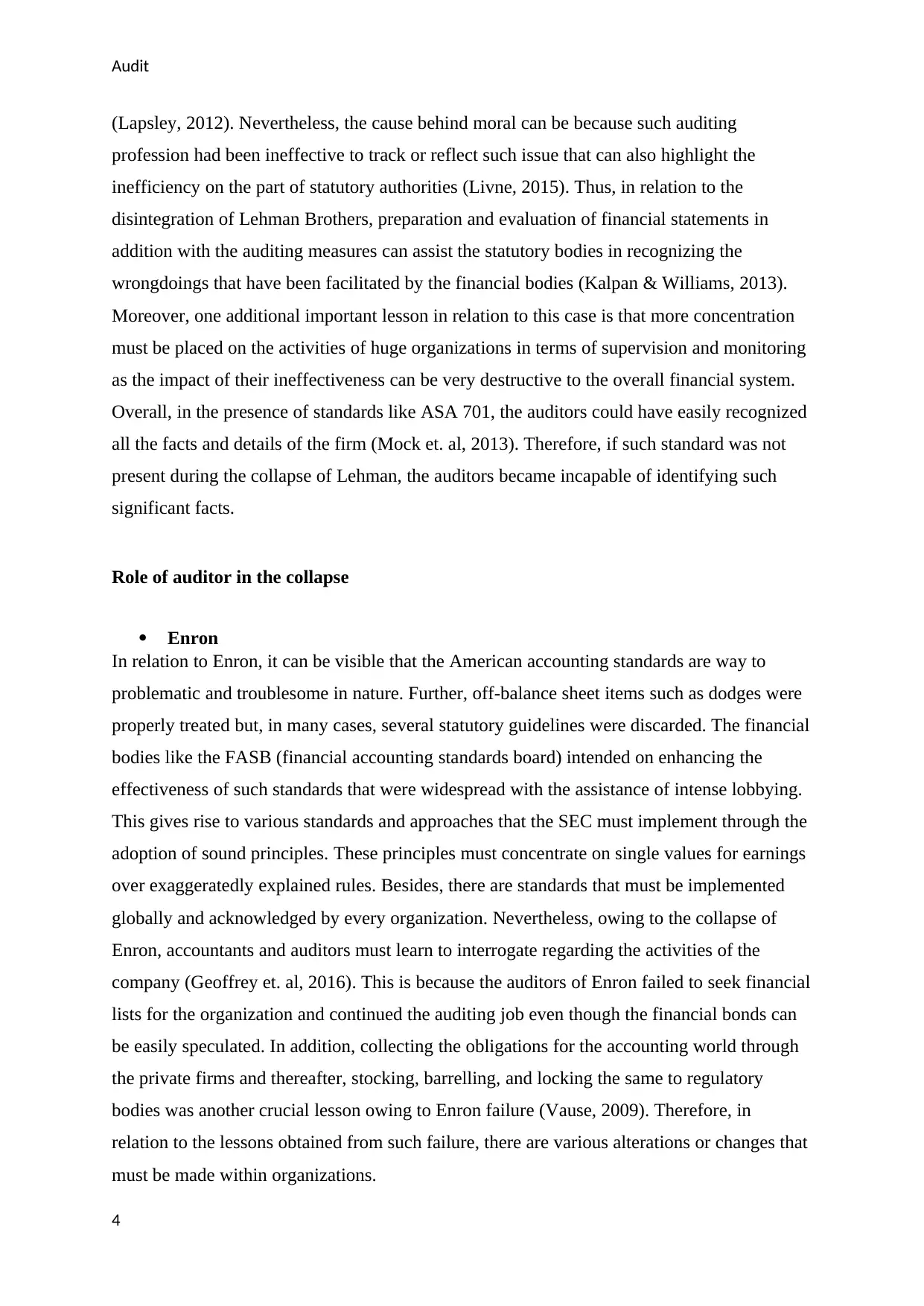
Audit
(Lapsley, 2012). Nevertheless, the cause behind moral can be because such auditing
profession had been ineffective to track or reflect such issue that can also highlight the
inefficiency on the part of statutory authorities (Livne, 2015). Thus, in relation to the
disintegration of Lehman Brothers, preparation and evaluation of financial statements in
addition with the auditing measures can assist the statutory bodies in recognizing the
wrongdoings that have been facilitated by the financial bodies (Kalpan & Williams, 2013).
Moreover, one additional important lesson in relation to this case is that more concentration
must be placed on the activities of huge organizations in terms of supervision and monitoring
as the impact of their ineffectiveness can be very destructive to the overall financial system.
Overall, in the presence of standards like ASA 701, the auditors could have easily recognized
all the facts and details of the firm (Mock et. al, 2013). Therefore, if such standard was not
present during the collapse of Lehman, the auditors became incapable of identifying such
significant facts.
Role of auditor in the collapse
Enron
In relation to Enron, it can be visible that the American accounting standards are way to
problematic and troublesome in nature. Further, off-balance sheet items such as dodges were
properly treated but, in many cases, several statutory guidelines were discarded. The financial
bodies like the FASB (financial accounting standards board) intended on enhancing the
effectiveness of such standards that were widespread with the assistance of intense lobbying.
This gives rise to various standards and approaches that the SEC must implement through the
adoption of sound principles. These principles must concentrate on single values for earnings
over exaggeratedly explained rules. Besides, there are standards that must be implemented
globally and acknowledged by every organization. Nevertheless, owing to the collapse of
Enron, accountants and auditors must learn to interrogate regarding the activities of the
company (Geoffrey et. al, 2016). This is because the auditors of Enron failed to seek financial
lists for the organization and continued the auditing job even though the financial bonds can
be easily speculated. In addition, collecting the obligations for the accounting world through
the private firms and thereafter, stocking, barrelling, and locking the same to regulatory
bodies was another crucial lesson owing to Enron failure (Vause, 2009). Therefore, in
relation to the lessons obtained from such failure, there are various alterations or changes that
must be made within organizations.
4
(Lapsley, 2012). Nevertheless, the cause behind moral can be because such auditing
profession had been ineffective to track or reflect such issue that can also highlight the
inefficiency on the part of statutory authorities (Livne, 2015). Thus, in relation to the
disintegration of Lehman Brothers, preparation and evaluation of financial statements in
addition with the auditing measures can assist the statutory bodies in recognizing the
wrongdoings that have been facilitated by the financial bodies (Kalpan & Williams, 2013).
Moreover, one additional important lesson in relation to this case is that more concentration
must be placed on the activities of huge organizations in terms of supervision and monitoring
as the impact of their ineffectiveness can be very destructive to the overall financial system.
Overall, in the presence of standards like ASA 701, the auditors could have easily recognized
all the facts and details of the firm (Mock et. al, 2013). Therefore, if such standard was not
present during the collapse of Lehman, the auditors became incapable of identifying such
significant facts.
Role of auditor in the collapse
Enron
In relation to Enron, it can be visible that the American accounting standards are way to
problematic and troublesome in nature. Further, off-balance sheet items such as dodges were
properly treated but, in many cases, several statutory guidelines were discarded. The financial
bodies like the FASB (financial accounting standards board) intended on enhancing the
effectiveness of such standards that were widespread with the assistance of intense lobbying.
This gives rise to various standards and approaches that the SEC must implement through the
adoption of sound principles. These principles must concentrate on single values for earnings
over exaggeratedly explained rules. Besides, there are standards that must be implemented
globally and acknowledged by every organization. Nevertheless, owing to the collapse of
Enron, accountants and auditors must learn to interrogate regarding the activities of the
company (Geoffrey et. al, 2016). This is because the auditors of Enron failed to seek financial
lists for the organization and continued the auditing job even though the financial bonds can
be easily speculated. In addition, collecting the obligations for the accounting world through
the private firms and thereafter, stocking, barrelling, and locking the same to regulatory
bodies was another crucial lesson owing to Enron failure (Vause, 2009). Therefore, in
relation to the lessons obtained from such failure, there are various alterations or changes that
must be made within organizations.
4
Paraphrase This Document
Need a fresh take? Get an instant paraphrase of this document with our AI Paraphraser
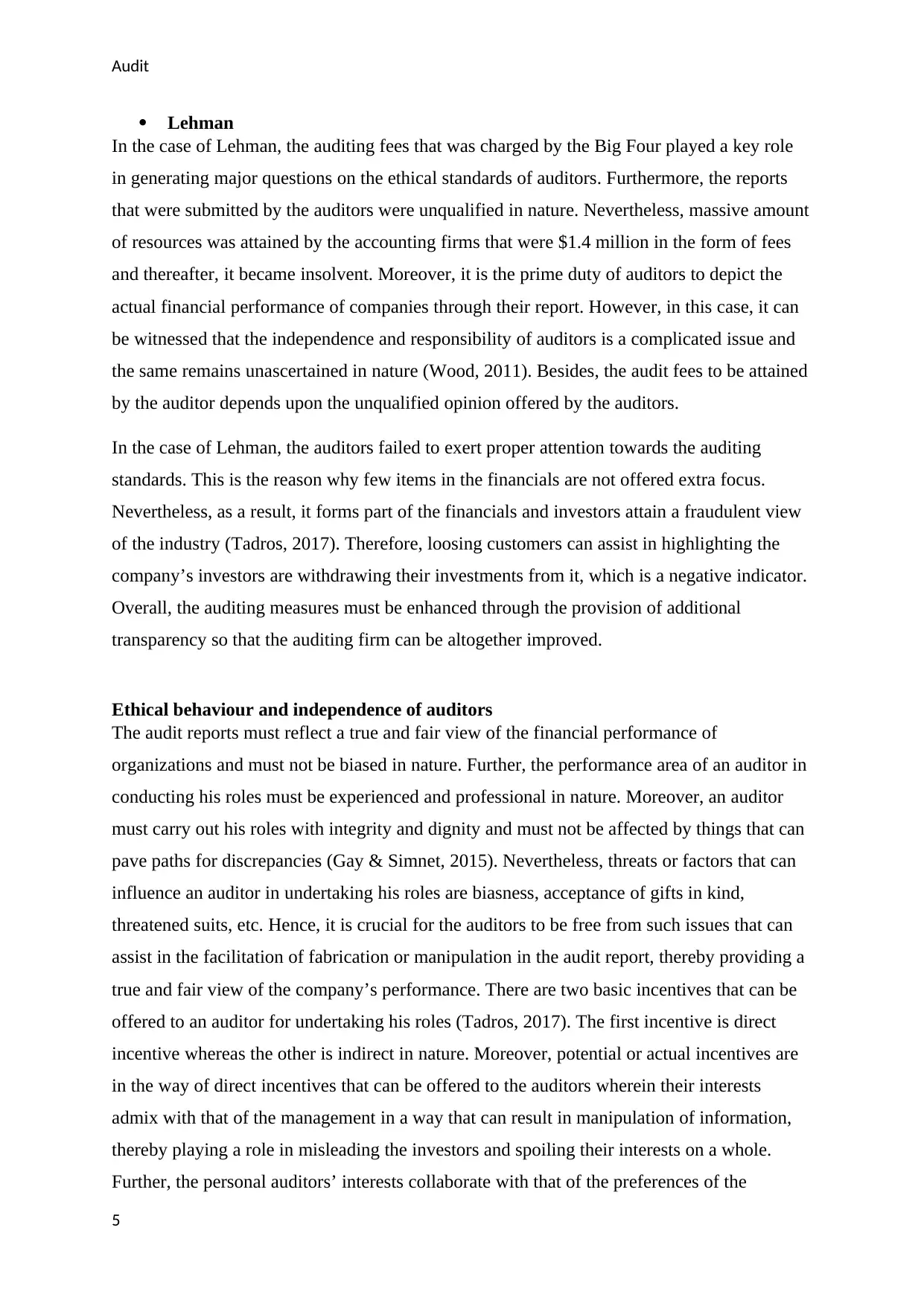
Audit
Lehman
In the case of Lehman, the auditing fees that was charged by the Big Four played a key role
in generating major questions on the ethical standards of auditors. Furthermore, the reports
that were submitted by the auditors were unqualified in nature. Nevertheless, massive amount
of resources was attained by the accounting firms that were $1.4 million in the form of fees
and thereafter, it became insolvent. Moreover, it is the prime duty of auditors to depict the
actual financial performance of companies through their report. However, in this case, it can
be witnessed that the independence and responsibility of auditors is a complicated issue and
the same remains unascertained in nature (Wood, 2011). Besides, the audit fees to be attained
by the auditor depends upon the unqualified opinion offered by the auditors.
In the case of Lehman, the auditors failed to exert proper attention towards the auditing
standards. This is the reason why few items in the financials are not offered extra focus.
Nevertheless, as a result, it forms part of the financials and investors attain a fraudulent view
of the industry (Tadros, 2017). Therefore, loosing customers can assist in highlighting the
company’s investors are withdrawing their investments from it, which is a negative indicator.
Overall, the auditing measures must be enhanced through the provision of additional
transparency so that the auditing firm can be altogether improved.
Ethical behaviour and independence of auditors
The audit reports must reflect a true and fair view of the financial performance of
organizations and must not be biased in nature. Further, the performance area of an auditor in
conducting his roles must be experienced and professional in nature. Moreover, an auditor
must carry out his roles with integrity and dignity and must not be affected by things that can
pave paths for discrepancies (Gay & Simnet, 2015). Nevertheless, threats or factors that can
influence an auditor in undertaking his roles are biasness, acceptance of gifts in kind,
threatened suits, etc. Hence, it is crucial for the auditors to be free from such issues that can
assist in the facilitation of fabrication or manipulation in the audit report, thereby providing a
true and fair view of the company’s performance. There are two basic incentives that can be
offered to an auditor for undertaking his roles (Tadros, 2017). The first incentive is direct
incentive whereas the other is indirect in nature. Moreover, potential or actual incentives are
in the way of direct incentives that can be offered to the auditors wherein their interests
admix with that of the management in a way that can result in manipulation of information,
thereby playing a role in misleading the investors and spoiling their interests on a whole.
Further, the personal auditors’ interests collaborate with that of the preferences of the
5
Lehman
In the case of Lehman, the auditing fees that was charged by the Big Four played a key role
in generating major questions on the ethical standards of auditors. Furthermore, the reports
that were submitted by the auditors were unqualified in nature. Nevertheless, massive amount
of resources was attained by the accounting firms that were $1.4 million in the form of fees
and thereafter, it became insolvent. Moreover, it is the prime duty of auditors to depict the
actual financial performance of companies through their report. However, in this case, it can
be witnessed that the independence and responsibility of auditors is a complicated issue and
the same remains unascertained in nature (Wood, 2011). Besides, the audit fees to be attained
by the auditor depends upon the unqualified opinion offered by the auditors.
In the case of Lehman, the auditors failed to exert proper attention towards the auditing
standards. This is the reason why few items in the financials are not offered extra focus.
Nevertheless, as a result, it forms part of the financials and investors attain a fraudulent view
of the industry (Tadros, 2017). Therefore, loosing customers can assist in highlighting the
company’s investors are withdrawing their investments from it, which is a negative indicator.
Overall, the auditing measures must be enhanced through the provision of additional
transparency so that the auditing firm can be altogether improved.
Ethical behaviour and independence of auditors
The audit reports must reflect a true and fair view of the financial performance of
organizations and must not be biased in nature. Further, the performance area of an auditor in
conducting his roles must be experienced and professional in nature. Moreover, an auditor
must carry out his roles with integrity and dignity and must not be affected by things that can
pave paths for discrepancies (Gay & Simnet, 2015). Nevertheless, threats or factors that can
influence an auditor in undertaking his roles are biasness, acceptance of gifts in kind,
threatened suits, etc. Hence, it is crucial for the auditors to be free from such issues that can
assist in the facilitation of fabrication or manipulation in the audit report, thereby providing a
true and fair view of the company’s performance. There are two basic incentives that can be
offered to an auditor for undertaking his roles (Tadros, 2017). The first incentive is direct
incentive whereas the other is indirect in nature. Moreover, potential or actual incentives are
in the way of direct incentives that can be offered to the auditors wherein their interests
admix with that of the management in a way that can result in manipulation of information,
thereby playing a role in misleading the investors and spoiling their interests on a whole.
Further, the personal auditors’ interests collaborate with that of the preferences of the
5
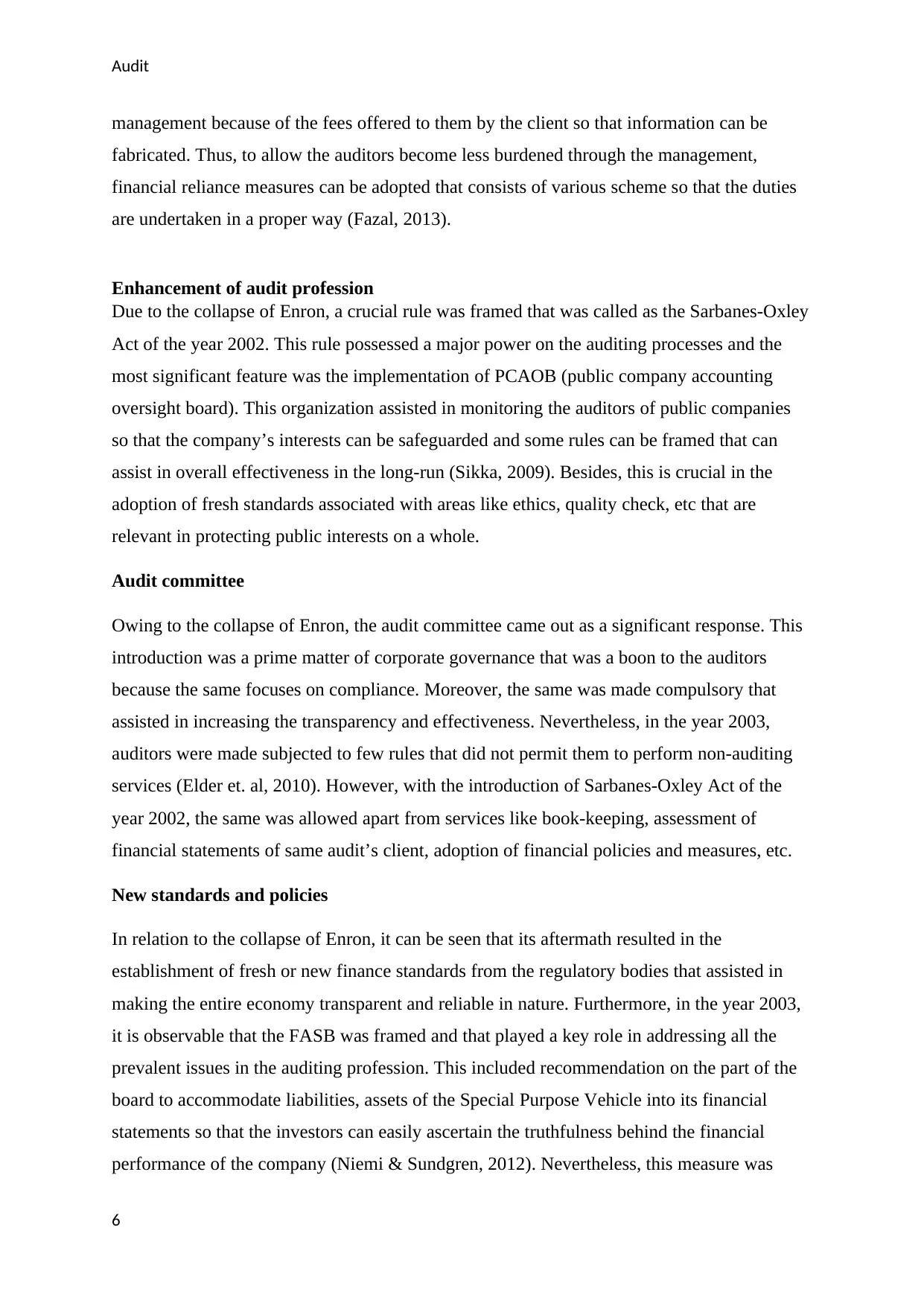
Audit
management because of the fees offered to them by the client so that information can be
fabricated. Thus, to allow the auditors become less burdened through the management,
financial reliance measures can be adopted that consists of various scheme so that the duties
are undertaken in a proper way (Fazal, 2013).
Enhancement of audit profession
Due to the collapse of Enron, a crucial rule was framed that was called as the Sarbanes-Oxley
Act of the year 2002. This rule possessed a major power on the auditing processes and the
most significant feature was the implementation of PCAOB (public company accounting
oversight board). This organization assisted in monitoring the auditors of public companies
so that the company’s interests can be safeguarded and some rules can be framed that can
assist in overall effectiveness in the long-run (Sikka, 2009). Besides, this is crucial in the
adoption of fresh standards associated with areas like ethics, quality check, etc that are
relevant in protecting public interests on a whole.
Audit committee
Owing to the collapse of Enron, the audit committee came out as a significant response. This
introduction was a prime matter of corporate governance that was a boon to the auditors
because the same focuses on compliance. Moreover, the same was made compulsory that
assisted in increasing the transparency and effectiveness. Nevertheless, in the year 2003,
auditors were made subjected to few rules that did not permit them to perform non-auditing
services (Elder et. al, 2010). However, with the introduction of Sarbanes-Oxley Act of the
year 2002, the same was allowed apart from services like book-keeping, assessment of
financial statements of same audit’s client, adoption of financial policies and measures, etc.
New standards and policies
In relation to the collapse of Enron, it can be seen that its aftermath resulted in the
establishment of fresh or new finance standards from the regulatory bodies that assisted in
making the entire economy transparent and reliable in nature. Furthermore, in the year 2003,
it is observable that the FASB was framed and that played a key role in addressing all the
prevalent issues in the auditing profession. This included recommendation on the part of the
board to accommodate liabilities, assets of the Special Purpose Vehicle into its financial
statements so that the investors can easily ascertain the truthfulness behind the financial
performance of the company (Niemi & Sundgren, 2012). Nevertheless, this measure was
6
management because of the fees offered to them by the client so that information can be
fabricated. Thus, to allow the auditors become less burdened through the management,
financial reliance measures can be adopted that consists of various scheme so that the duties
are undertaken in a proper way (Fazal, 2013).
Enhancement of audit profession
Due to the collapse of Enron, a crucial rule was framed that was called as the Sarbanes-Oxley
Act of the year 2002. This rule possessed a major power on the auditing processes and the
most significant feature was the implementation of PCAOB (public company accounting
oversight board). This organization assisted in monitoring the auditors of public companies
so that the company’s interests can be safeguarded and some rules can be framed that can
assist in overall effectiveness in the long-run (Sikka, 2009). Besides, this is crucial in the
adoption of fresh standards associated with areas like ethics, quality check, etc that are
relevant in protecting public interests on a whole.
Audit committee
Owing to the collapse of Enron, the audit committee came out as a significant response. This
introduction was a prime matter of corporate governance that was a boon to the auditors
because the same focuses on compliance. Moreover, the same was made compulsory that
assisted in increasing the transparency and effectiveness. Nevertheless, in the year 2003,
auditors were made subjected to few rules that did not permit them to perform non-auditing
services (Elder et. al, 2010). However, with the introduction of Sarbanes-Oxley Act of the
year 2002, the same was allowed apart from services like book-keeping, assessment of
financial statements of same audit’s client, adoption of financial policies and measures, etc.
New standards and policies
In relation to the collapse of Enron, it can be seen that its aftermath resulted in the
establishment of fresh or new finance standards from the regulatory bodies that assisted in
making the entire economy transparent and reliable in nature. Furthermore, in the year 2003,
it is observable that the FASB was framed and that played a key role in addressing all the
prevalent issues in the auditing profession. This included recommendation on the part of the
board to accommodate liabilities, assets of the Special Purpose Vehicle into its financial
statements so that the investors can easily ascertain the truthfulness behind the financial
performance of the company (Niemi & Sundgren, 2012). Nevertheless, this measure was
6
⊘ This is a preview!⊘
Do you want full access?
Subscribe today to unlock all pages.

Trusted by 1+ million students worldwide
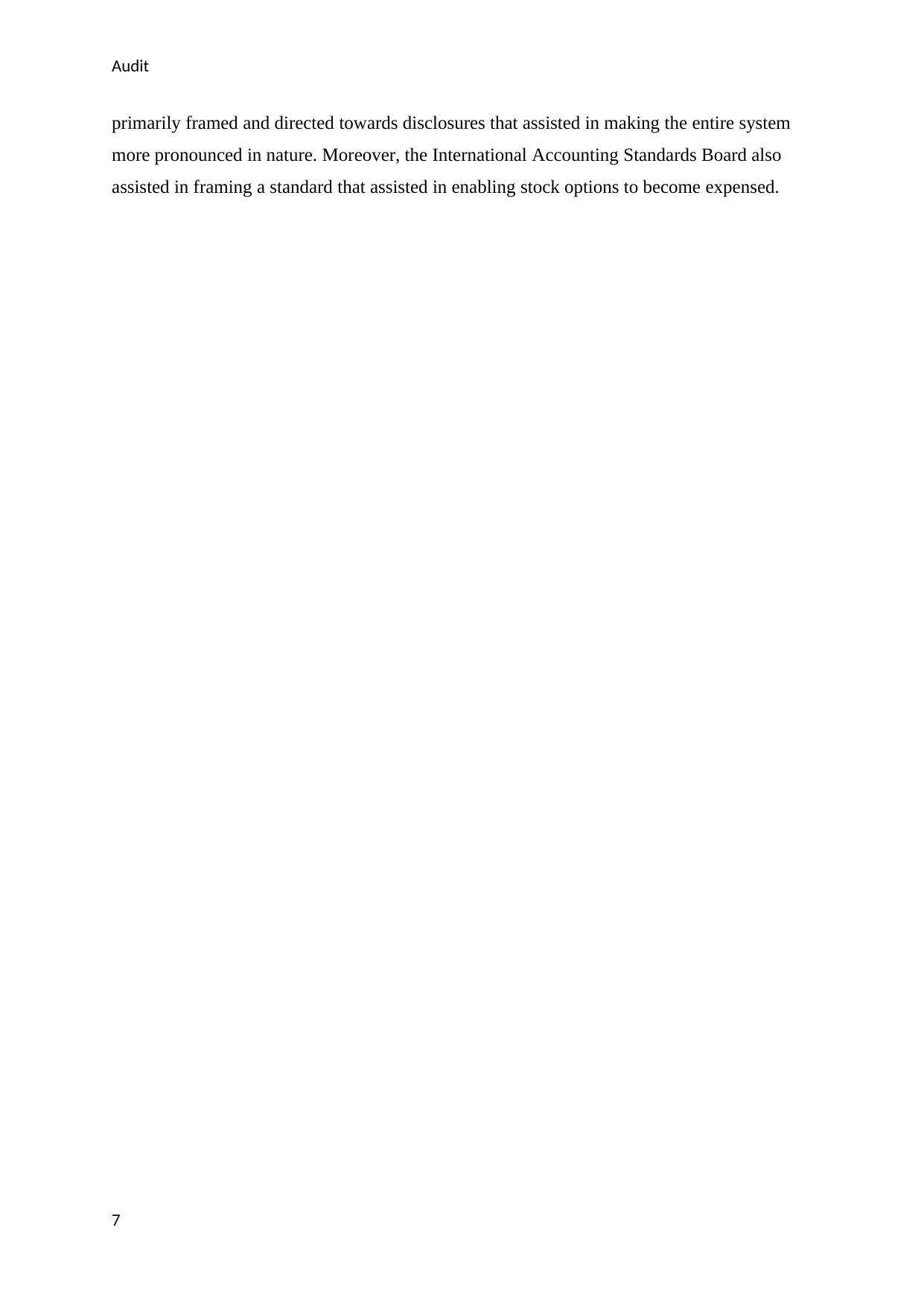
Audit
primarily framed and directed towards disclosures that assisted in making the entire system
more pronounced in nature. Moreover, the International Accounting Standards Board also
assisted in framing a standard that assisted in enabling stock options to become expensed.
7
primarily framed and directed towards disclosures that assisted in making the entire system
more pronounced in nature. Moreover, the International Accounting Standards Board also
assisted in framing a standard that assisted in enabling stock options to become expensed.
7
Paraphrase This Document
Need a fresh take? Get an instant paraphrase of this document with our AI Paraphraser
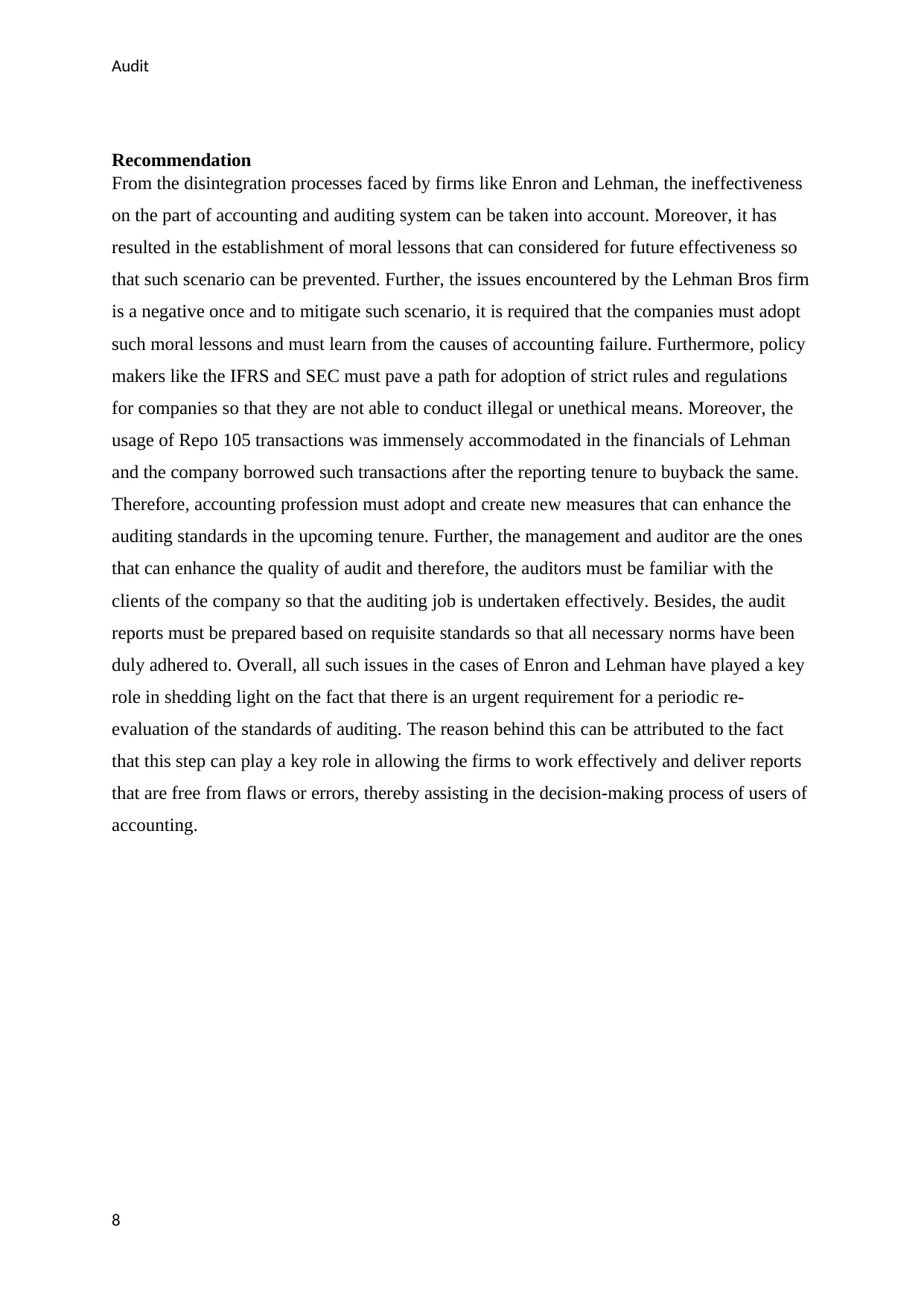
Audit
Recommendation
From the disintegration processes faced by firms like Enron and Lehman, the ineffectiveness
on the part of accounting and auditing system can be taken into account. Moreover, it has
resulted in the establishment of moral lessons that can considered for future effectiveness so
that such scenario can be prevented. Further, the issues encountered by the Lehman Bros firm
is a negative once and to mitigate such scenario, it is required that the companies must adopt
such moral lessons and must learn from the causes of accounting failure. Furthermore, policy
makers like the IFRS and SEC must pave a path for adoption of strict rules and regulations
for companies so that they are not able to conduct illegal or unethical means. Moreover, the
usage of Repo 105 transactions was immensely accommodated in the financials of Lehman
and the company borrowed such transactions after the reporting tenure to buyback the same.
Therefore, accounting profession must adopt and create new measures that can enhance the
auditing standards in the upcoming tenure. Further, the management and auditor are the ones
that can enhance the quality of audit and therefore, the auditors must be familiar with the
clients of the company so that the auditing job is undertaken effectively. Besides, the audit
reports must be prepared based on requisite standards so that all necessary norms have been
duly adhered to. Overall, all such issues in the cases of Enron and Lehman have played a key
role in shedding light on the fact that there is an urgent requirement for a periodic re-
evaluation of the standards of auditing. The reason behind this can be attributed to the fact
that this step can play a key role in allowing the firms to work effectively and deliver reports
that are free from flaws or errors, thereby assisting in the decision-making process of users of
accounting.
8
Recommendation
From the disintegration processes faced by firms like Enron and Lehman, the ineffectiveness
on the part of accounting and auditing system can be taken into account. Moreover, it has
resulted in the establishment of moral lessons that can considered for future effectiveness so
that such scenario can be prevented. Further, the issues encountered by the Lehman Bros firm
is a negative once and to mitigate such scenario, it is required that the companies must adopt
such moral lessons and must learn from the causes of accounting failure. Furthermore, policy
makers like the IFRS and SEC must pave a path for adoption of strict rules and regulations
for companies so that they are not able to conduct illegal or unethical means. Moreover, the
usage of Repo 105 transactions was immensely accommodated in the financials of Lehman
and the company borrowed such transactions after the reporting tenure to buyback the same.
Therefore, accounting profession must adopt and create new measures that can enhance the
auditing standards in the upcoming tenure. Further, the management and auditor are the ones
that can enhance the quality of audit and therefore, the auditors must be familiar with the
clients of the company so that the auditing job is undertaken effectively. Besides, the audit
reports must be prepared based on requisite standards so that all necessary norms have been
duly adhered to. Overall, all such issues in the cases of Enron and Lehman have played a key
role in shedding light on the fact that there is an urgent requirement for a periodic re-
evaluation of the standards of auditing. The reason behind this can be attributed to the fact
that this step can play a key role in allowing the firms to work effectively and deliver reports
that are free from flaws or errors, thereby assisting in the decision-making process of users of
accounting.
8
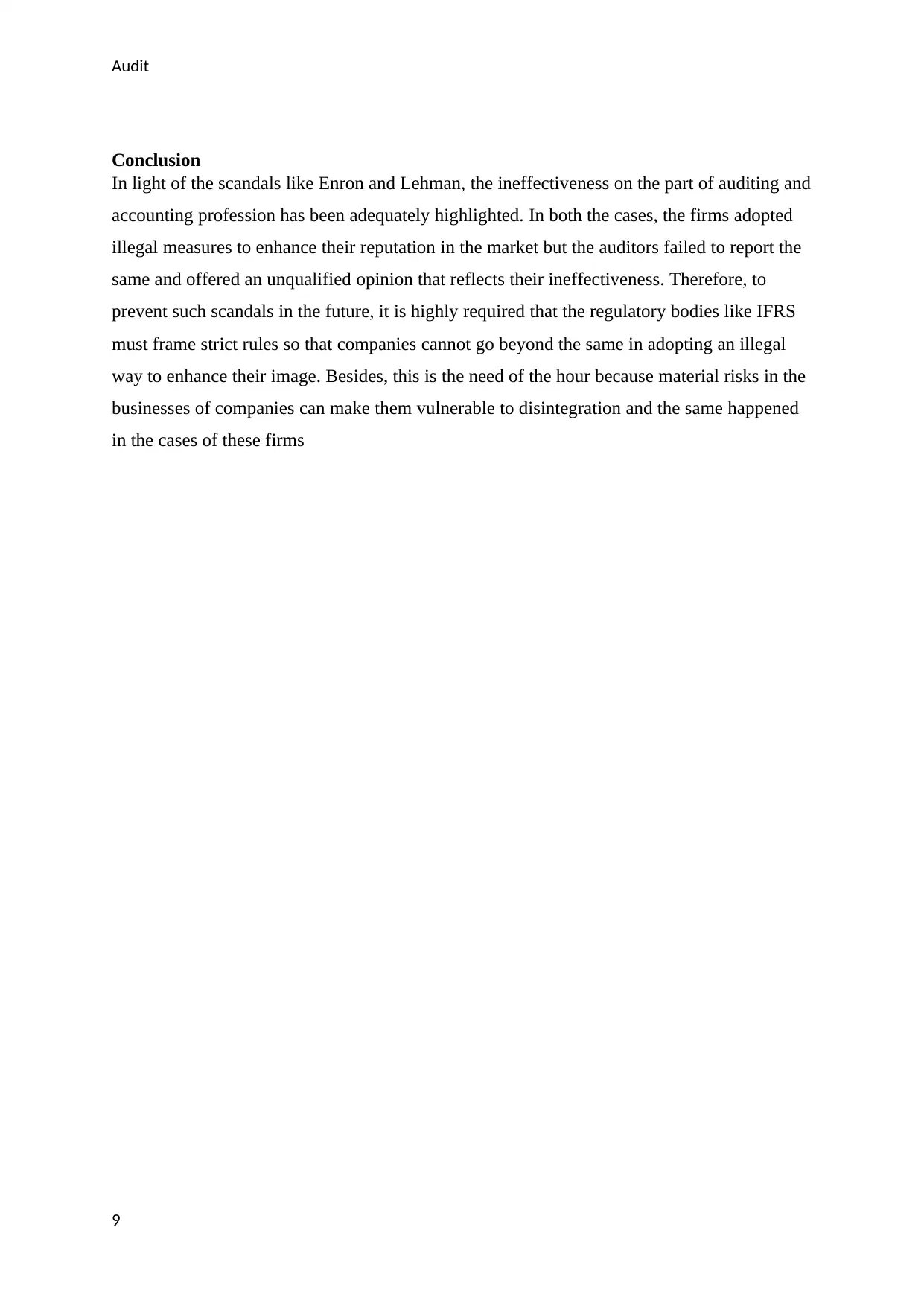
Audit
Conclusion
In light of the scandals like Enron and Lehman, the ineffectiveness on the part of auditing and
accounting profession has been adequately highlighted. In both the cases, the firms adopted
illegal measures to enhance their reputation in the market but the auditors failed to report the
same and offered an unqualified opinion that reflects their ineffectiveness. Therefore, to
prevent such scandals in the future, it is highly required that the regulatory bodies like IFRS
must frame strict rules so that companies cannot go beyond the same in adopting an illegal
way to enhance their image. Besides, this is the need of the hour because material risks in the
businesses of companies can make them vulnerable to disintegration and the same happened
in the cases of these firms
9
Conclusion
In light of the scandals like Enron and Lehman, the ineffectiveness on the part of auditing and
accounting profession has been adequately highlighted. In both the cases, the firms adopted
illegal measures to enhance their reputation in the market but the auditors failed to report the
same and offered an unqualified opinion that reflects their ineffectiveness. Therefore, to
prevent such scandals in the future, it is highly required that the regulatory bodies like IFRS
must frame strict rules so that companies cannot go beyond the same in adopting an illegal
way to enhance their image. Besides, this is the need of the hour because material risks in the
businesses of companies can make them vulnerable to disintegration and the same happened
in the cases of these firms
9
⊘ This is a preview!⊘
Do you want full access?
Subscribe today to unlock all pages.

Trusted by 1+ million students worldwide
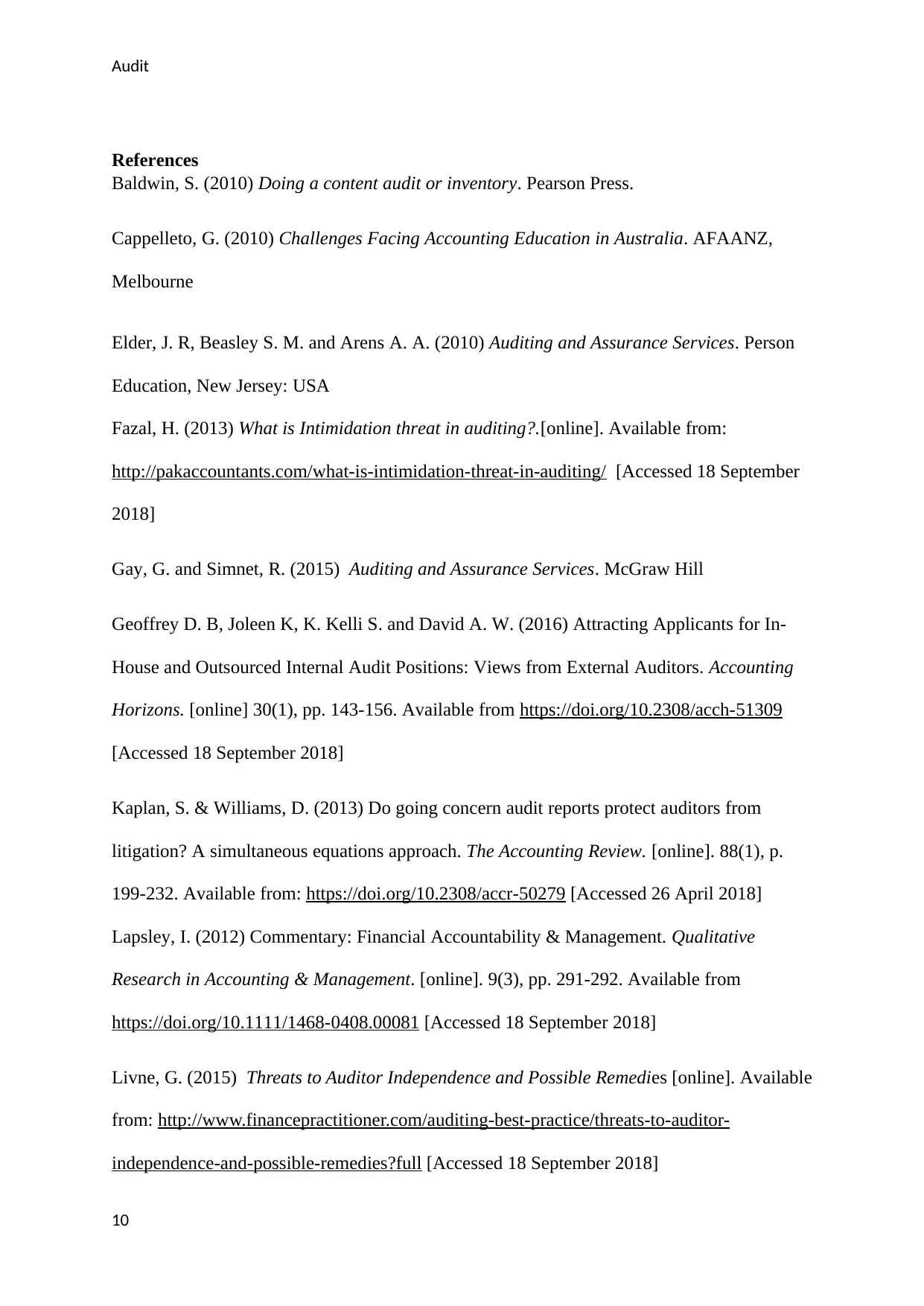
Audit
References
Baldwin, S. (2010) Doing a content audit or inventory. Pearson Press.
Cappelleto, G. (2010) Challenges Facing Accounting Education in Australia. AFAANZ,
Melbourne
Elder, J. R, Beasley S. M. and Arens A. A. (2010) Auditing and Assurance Services. Person
Education, New Jersey: USA
Fazal, H. (2013) What is Intimidation threat in auditing?.[online]. Available from:
http://pakaccountants.com/what-is-intimidation-threat-in-auditing/ [Accessed 18 September
2018]
Gay, G. and Simnet, R. (2015) Auditing and Assurance Services. McGraw Hill
Geoffrey D. B, Joleen K, K. Kelli S. and David A. W. (2016) Attracting Applicants for In-
House and Outsourced Internal Audit Positions: Views from External Auditors. Accounting
Horizons. [online] 30(1), pp. 143-156. Available from https://doi.org/10.2308/acch-51309
[Accessed 18 September 2018]
Kaplan, S. & Williams, D. (2013) Do going concern audit reports protect auditors from
litigation? A simultaneous equations approach. The Accounting Review. [online]. 88(1), p.
199-232. Available from: https://doi.org/10.2308/accr-50279 [Accessed 26 April 2018]
Lapsley, I. (2012) Commentary: Financial Accountability & Management. Qualitative
Research in Accounting & Management. [online]. 9(3), pp. 291-292. Available from
https://doi.org/10.1111/1468-0408.00081 [Accessed 18 September 2018]
Livne, G. (2015) Threats to Auditor Independence and Possible Remedies [online]. Available
from: http://www.financepractitioner.com/auditing-best-practice/threats-to-auditor-
independence-and-possible-remedies?full [Accessed 18 September 2018]
10
References
Baldwin, S. (2010) Doing a content audit or inventory. Pearson Press.
Cappelleto, G. (2010) Challenges Facing Accounting Education in Australia. AFAANZ,
Melbourne
Elder, J. R, Beasley S. M. and Arens A. A. (2010) Auditing and Assurance Services. Person
Education, New Jersey: USA
Fazal, H. (2013) What is Intimidation threat in auditing?.[online]. Available from:
http://pakaccountants.com/what-is-intimidation-threat-in-auditing/ [Accessed 18 September
2018]
Gay, G. and Simnet, R. (2015) Auditing and Assurance Services. McGraw Hill
Geoffrey D. B, Joleen K, K. Kelli S. and David A. W. (2016) Attracting Applicants for In-
House and Outsourced Internal Audit Positions: Views from External Auditors. Accounting
Horizons. [online] 30(1), pp. 143-156. Available from https://doi.org/10.2308/acch-51309
[Accessed 18 September 2018]
Kaplan, S. & Williams, D. (2013) Do going concern audit reports protect auditors from
litigation? A simultaneous equations approach. The Accounting Review. [online]. 88(1), p.
199-232. Available from: https://doi.org/10.2308/accr-50279 [Accessed 26 April 2018]
Lapsley, I. (2012) Commentary: Financial Accountability & Management. Qualitative
Research in Accounting & Management. [online]. 9(3), pp. 291-292. Available from
https://doi.org/10.1111/1468-0408.00081 [Accessed 18 September 2018]
Livne, G. (2015) Threats to Auditor Independence and Possible Remedies [online]. Available
from: http://www.financepractitioner.com/auditing-best-practice/threats-to-auditor-
independence-and-possible-remedies?full [Accessed 18 September 2018]
10
Paraphrase This Document
Need a fresh take? Get an instant paraphrase of this document with our AI Paraphraser
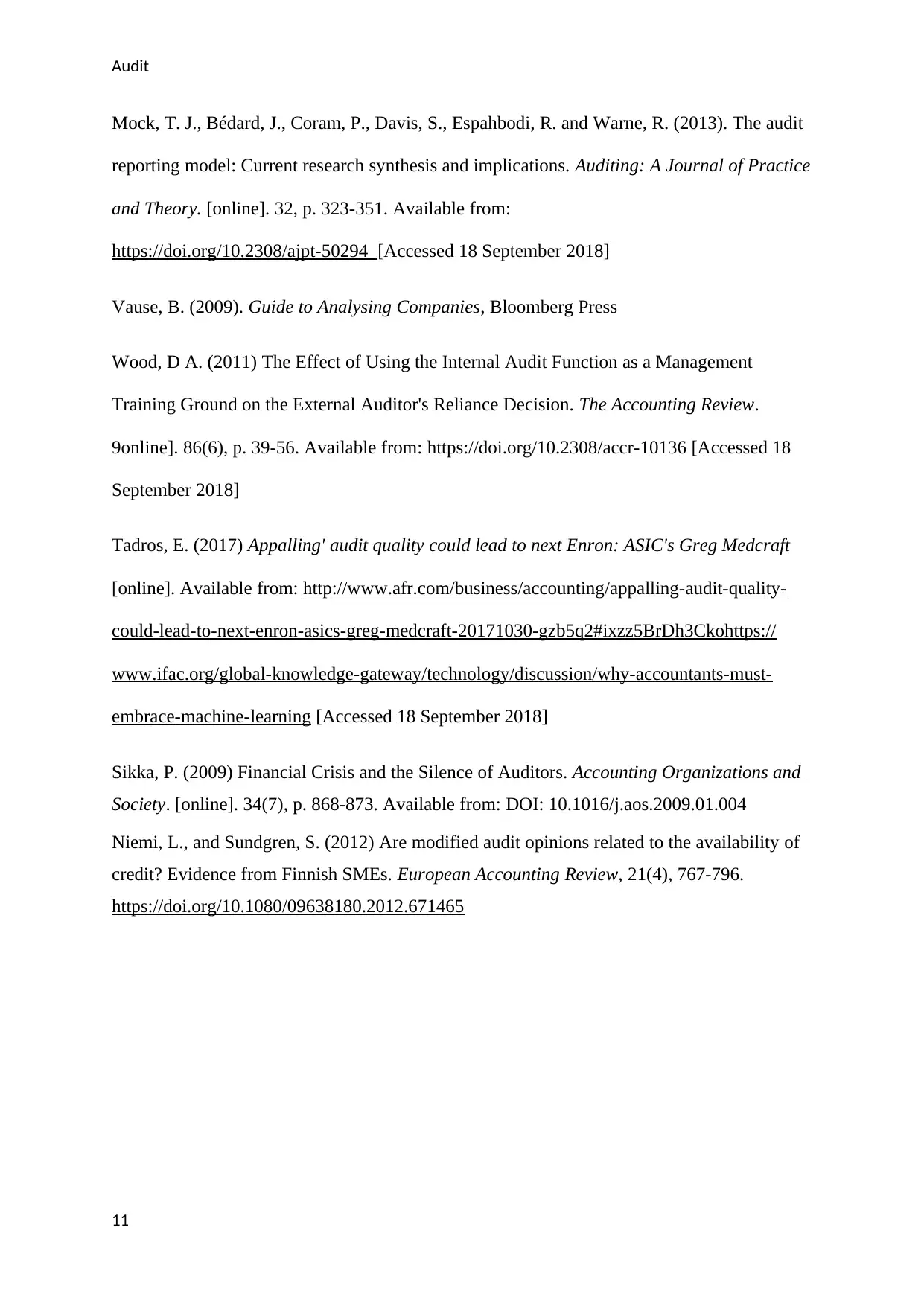
Audit
Mock, T. J., Bédard, J., Coram, P., Davis, S., Espahbodi, R. and Warne, R. (2013). The audit
reporting model: Current research synthesis and implications. Auditing: A Journal of Practice
and Theory. [online]. 32, p. 323-351. Available from:
https://doi.org/10.2308/ajpt-50294 [Accessed 18 September 2018]
Vause, B. (2009). Guide to Analysing Companies, Bloomberg Press
Wood, D A. (2011) The Effect of Using the Internal Audit Function as a Management
Training Ground on the External Auditor's Reliance Decision. The Accounting Review.
9online]. 86(6), p. 39-56. Available from: https://doi.org/10.2308/accr-10136 [Accessed 18
September 2018]
Tadros, E. (2017) Appalling' audit quality could lead to next Enron: ASIC's Greg Medcraft
[online]. Available from: http://www.afr.com/business/accounting/appalling-audit-quality-
could-lead-to-next-enron-asics-greg-medcraft-20171030-gzb5q2#ixzz5BrDh3Ckohttps://
www.ifac.org/global-knowledge-gateway/technology/discussion/why-accountants-must-
embrace-machine-learning [Accessed 18 September 2018]
Sikka, P. (2009) Financial Crisis and the Silence of Auditors. Accounting Organizations and
Society. [online]. 34(7), p. 868-873. Available from: DOI: 10.1016/j.aos.2009.01.004
Niemi, L., and Sundgren, S. (2012) Are modified audit opinions related to the availability of
credit? Evidence from Finnish SMEs. European Accounting Review, 21(4), 767-796.
https://doi.org/10.1080/09638180.2012.671465
11
Mock, T. J., Bédard, J., Coram, P., Davis, S., Espahbodi, R. and Warne, R. (2013). The audit
reporting model: Current research synthesis and implications. Auditing: A Journal of Practice
and Theory. [online]. 32, p. 323-351. Available from:
https://doi.org/10.2308/ajpt-50294 [Accessed 18 September 2018]
Vause, B. (2009). Guide to Analysing Companies, Bloomberg Press
Wood, D A. (2011) The Effect of Using the Internal Audit Function as a Management
Training Ground on the External Auditor's Reliance Decision. The Accounting Review.
9online]. 86(6), p. 39-56. Available from: https://doi.org/10.2308/accr-10136 [Accessed 18
September 2018]
Tadros, E. (2017) Appalling' audit quality could lead to next Enron: ASIC's Greg Medcraft
[online]. Available from: http://www.afr.com/business/accounting/appalling-audit-quality-
could-lead-to-next-enron-asics-greg-medcraft-20171030-gzb5q2#ixzz5BrDh3Ckohttps://
www.ifac.org/global-knowledge-gateway/technology/discussion/why-accountants-must-
embrace-machine-learning [Accessed 18 September 2018]
Sikka, P. (2009) Financial Crisis and the Silence of Auditors. Accounting Organizations and
Society. [online]. 34(7), p. 868-873. Available from: DOI: 10.1016/j.aos.2009.01.004
Niemi, L., and Sundgren, S. (2012) Are modified audit opinions related to the availability of
credit? Evidence from Finnish SMEs. European Accounting Review, 21(4), 767-796.
https://doi.org/10.1080/09638180.2012.671465
11
1 out of 11
Related Documents
Your All-in-One AI-Powered Toolkit for Academic Success.
+13062052269
info@desklib.com
Available 24*7 on WhatsApp / Email
![[object Object]](/_next/static/media/star-bottom.7253800d.svg)
Unlock your academic potential
Copyright © 2020–2026 A2Z Services. All Rights Reserved. Developed and managed by ZUCOL.





